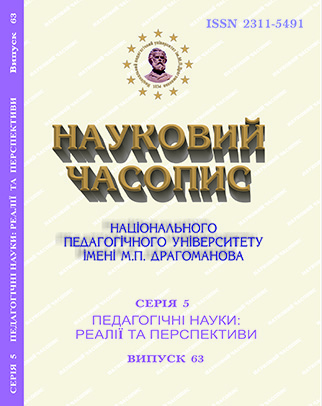ЗАРУБІЖНІ МОДЕЛІ ФОРМУВАННЯ АКТИВНОЇ ГРОМАДЯНСЬКОЇ ПОЗИЦІЇ ШКОЛЯРІВ В ОСВІТНЬОМУ ЗАКЛАДІ
Ключові слова:
громадянське суспільство, громадянськість, громадянська освіта, громадянське виховання, активна громадянська позиція, громадянські цінності, школярі, освітній закладАнотація
У статті розглянуті сучасні підходи до визначення поняття “активна громадянська позиція”, “громадянське суспільство”, “громадянські цінності”, “активний громадянин”; виділені основні ознаки активного громадянства в зарубіжних концепціях. Автор досліджує теоретичні погляди зарубіжних вчених із проблеми громадянськості, системи громадянських цінностей в науковій літературі, визначає характерні особливості різних зарубіжних наукових теорій у контексті проблеми формування активної громадянської позиції в освітньому середовищі навчального закладу. Автор розглядає зарубіжні моделі формування активної громадянської позиції школярів в освітніх закладах, зазначає, що в даний час загальновизнаною є необхідність громадянського виховання молоді, розробки єдиної державної політики в галузі громадянської освіти, громадянської ідеології, яка б консолідувала українське суспільство на основі громадянських цінностей.Посилання
Delanty G. Theorizing citizenship in a global age. In W. Hudson, & S. Slaughter. (Eds.). Globalization and Citizenship (pp. 15-29). New York : Routledge, 2007.
Delanty G. Communitarianism and citizenship. In E. F. Isin & B. Turner (Eds.), Handbook of citizenship studies (pp. 161-174). London : Sage Publications Ltd., 2002.
Isin E., & Turner B. Citizenship studies: An introduction. In E. Isin & B. Turner (Eds.), Handbook of citizenship studies (pp. 1-10). London : Sage, 2002.
Hahn S. Building the foundation for global citizenship: A pilot project. The Modern Language Journal, 1983, 67(2), 152-158. Retrieved from http://www.jstor.org/stable/328290.
Arendt H. The human condition (2nd ed.). Chicago: The University of Chicago Press, 1958/1998.
Williams J. Introduction. In N. Dower & J. Williams (Eds.), Global citizenship: A critical introduction (pp. 1-8). New York : Routledge, 2002.
Piaget J. The origins of intelligence in children. New York : International University Press, 1952.
Piaget J. Play, dreams and imitation in childhood. London : Routledge, 1962.
Frye M., Lee A. (Eds.) Character education informational handbook and guide, 2002. Retrieved from http://www.ncpublicschools. org/charactereducation/handbook/pdf/content.pdf.
Saballa M., & Smith, K. Working with children to create policy: The case of the Australian Capital Territory’s Children’s Plan. In G. MacNaughton, P. Hughes & K. Smith (Eds.), Young children as active citizens (pp. 62-76). Newcastle : Cambridge Scholars Publishing, 2008.
Выготский Л.С. Психология развития человека. – М. : Изд-во Смысл; Изд-во Эксмо, 2005. – 1136 с.
Kitchenham А. The Evolution of John Mezirow’s Transformative Learning Theory. Journal of Transformative Education, 2008. pp. 104–123.
Biesta G. Education and the democratic person: Towards a political conception of democratic education [Electronic Version]. Teachers College Record, 2007, 109, 740-769. Retrieved March 29, 2009, from http://www.tcrecord.org.
Biesta G. How to exist politically and learn from it: Hannah Arendt and the problem of democratic education [Electronic Version]. Teachers College Record, 2010, 112 9-10. Retrieved August 28, 2009, from http://www.tcrecord.org/content.asp?contentid=15744.
Hart R. Children’s participation: The theory and practice of involving young citizens in community development and environmental care. London : Earthscan Publications, 1997.
Cockburn T. Children and citizenship in Britain: A case for a socially interdependent model of citizenship. Childhood. 1998. 5(1). 99–117.
Lansdown G. (). Innocenti insight: The evolving capacities of the child. Florence : UNICEF Innocenti Research Centre. 2005.
Kulnych J. No playing the public sphere: Democratic theory and the exclusion of children. Social theory and practice. 2001. 27(2). 231–265.


